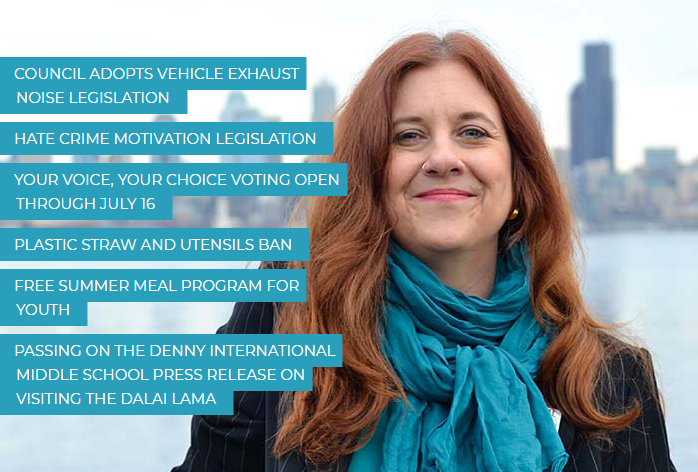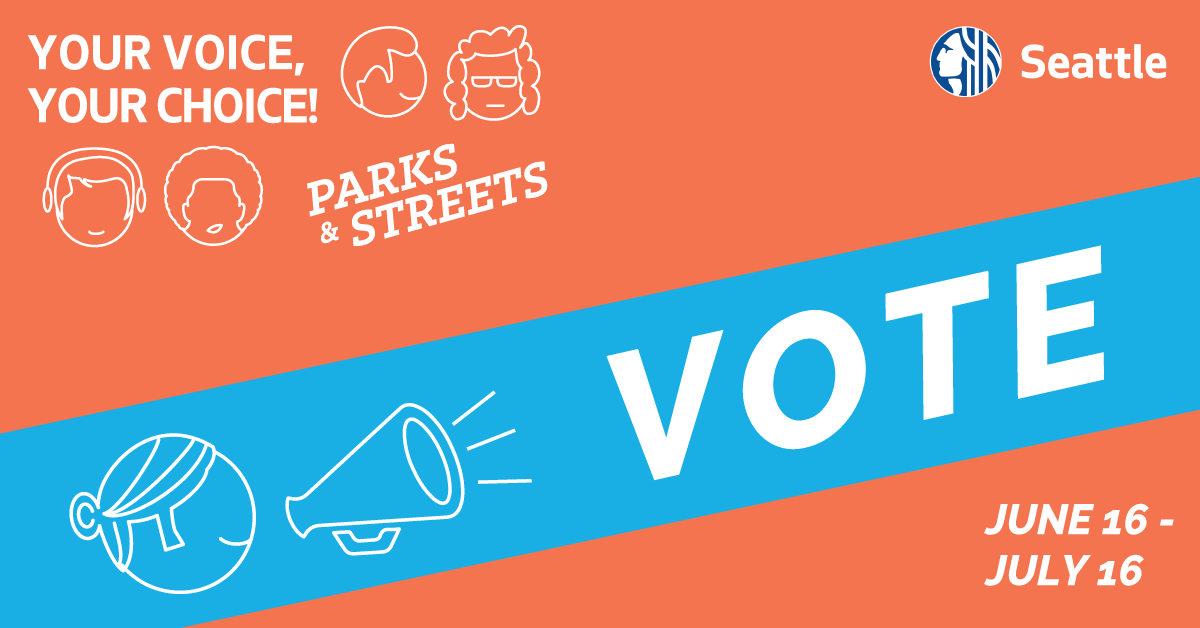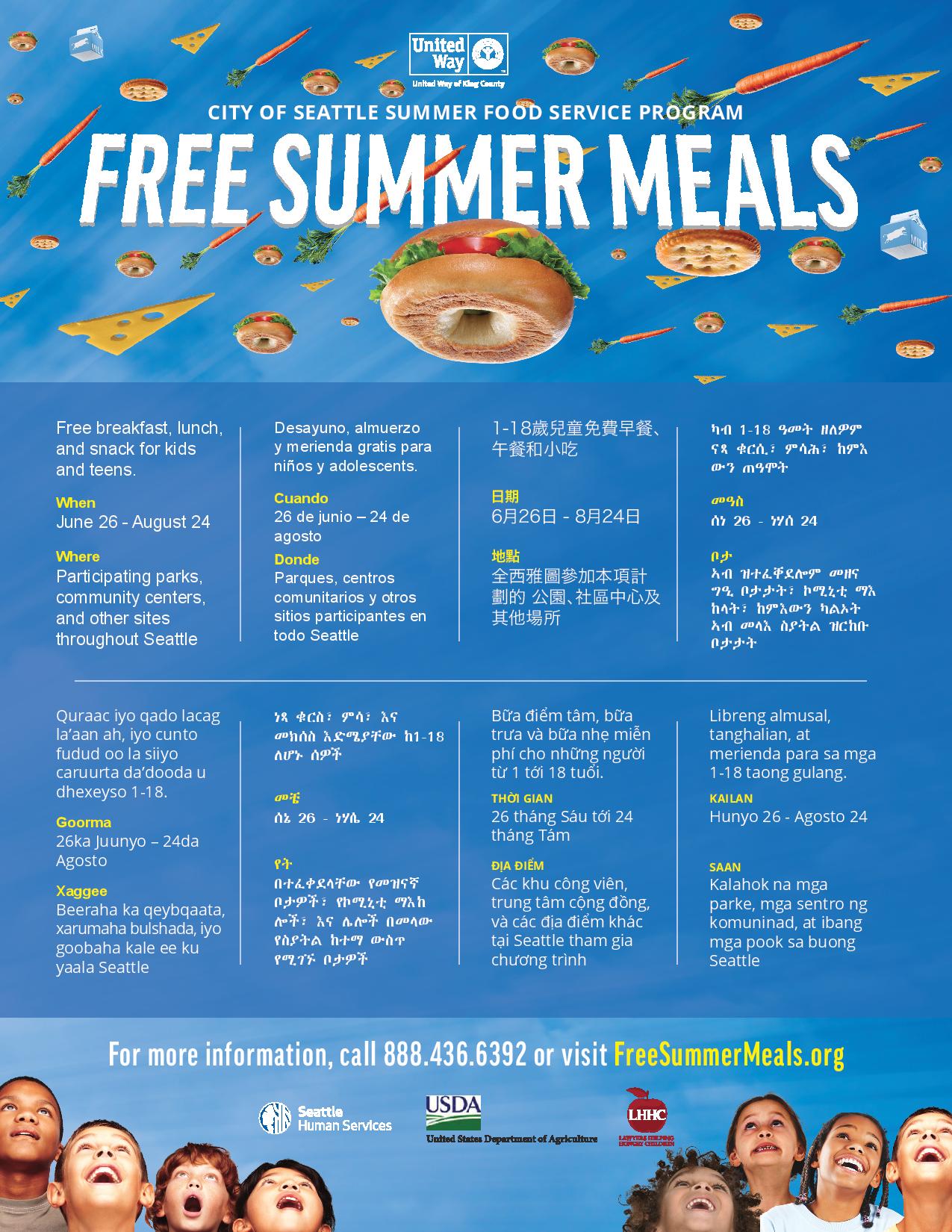Vehicle exhaust noise; Hate Crime Motivation Legislation; Your Voice, Your Choice voting; Plastic Straw & Utensils Ban; Free Summer Meals for Youths
Council adopts vehicle exhaust noise legislation
On Monday, the City Council adopted legislation that I sponsored to simplify enforcement of existing law prohibiting excessive vehicle exhaust noise. Enforcement currently requires use of a sound meter, which police officers usually don’t carry, and meters require calibration.
SPD noted in the committee discussion last week that they plan to use education as a first step, before issuing citations. The new law will go into effect 30 days after the Mayor signs the bill.
Laws currently on the book for stereo noise and screeching tire noise are enforceable as written.
Many thanks to community members who, beginning last fall during budget deliberations, have come to testify about the impacts of modified mufflers. Background on the community’s efforts that led to my proposing the legislation is available here.
Hate Crime Motivation Legislation
On June 19th the Civil Rights, Utilities, Economic Development and Arts Committee heard a first briefing on legislation to establish a hate crime-motivation in the Seattle Municipal Code. The legislation has been proposed by the City Attorney Office. I am the sponsor of the legislation.
If passed, the legislation would give the City Attorney’s Office (CAO) greater ability to prosecute hate crimes that aren’t being prosecuted under the state felony Malicious Harassment law.
The importance of this issue is highlighted by increasing reports of hate crimes in Seattle, in line with alarming national trends. Last year, upon my request, the City Auditor prepared a Review of Hate Crime Prevention, Response and Reporting in Seattle Phase 1 Report with findings that reports of hate crimes had increased 126% from 2012 to 2016. There was a further 64% increase from 2016 to 2017. 2018 figures show high rates as well.
Adding a hate crime motivation section to the Seattle Municipal Code would allow the CAO to add a hate crime motivation to charges for assault, harassment, or property destruction, and request a higher sentence.
A hate crime motivation in the Seattle Municipal Code would have two key effects. First of all, the CAO would be able to prosecute hate crimes against all protected classes at the City level. The City’s malicious harassment law allows only for prosecution of malicious harassment based upon age, parental status, political ideology, marital status, and homelessness. Adding a hate crime motivation provision would allow the CAO to prosecute malicious harassment based on race, color, religion, ancestry, national origin, gender, sexual orientation, or mental, physical, or sensory handicap.
Secondly, the CAO would no longer need to prove the element of malice; the new special allegation requires only that the person committed the act intentionally. This will allow the CAO to more broadly safeguard protected classes.
The hate crime motivation provision would replace the malicious harassment law, which is used only a few times per year. The state felony malicious harassment law could still be used for prosecution by the state or King County Prosecutor for felony cases.
The Committee will next consider the legislation on July 10.
Your Voice, Your Choice voting open through July 16
Voting has begun for the 2018 Your Voice, Your Choice Parks & Streets program.
A total of $285,000 is available in each of Seattle’s Council Districts. You can vote for your top three choices in the district where you live, work, go to school, or volunteer. Community members age 11 and up can vote online or at in-person polling stations through July 16. Paper ballots are available at all Seattle Public Library branches.
You can vote in District 1 here; here’s a link for the rest of the city.
Here’s the map of proposed projects, and project descriptions by SDOT and Parks.
Winning projects will be announced in August, and funded and implemented in 2019.
Background on the program and work done earlier this year is available here.
Plastic Straw and Utensils Ban
In 2008 the City Council passed an ordinance banning plastic service ware (including straws and utensils) with items to be banned having a multiyear planned phase-in as follows:
- Banned January 2009 – expanded polystyrene food service food containers, plates, “clamshells,” hot and cold beverage cups, meat and vegetable trays, egg cartons used for selling or providing food for consumption on or off the premises. (exempted was raw meat and seafood expanded polystyrene food service food containers).
- Banned July 2009 – raw meat and seafood expanded polystyrene food service food containers.
- Banned July 2010 – Disposable plastic food service ware, or non-recyclable containers, plates, “clamshells,” serving trays, meat and vegetable trays, hot and cold beverage cups, and utensils that are made of plastic or plastic-coated paper and intended only for onetime use (including so-called biodegradable products where any portion is not compostable).
Since options were not widely available for straws and utensils in compostable or recyclable forms, the city decided to allow the market time to catch up before enforcing that part of the ban. Seattle Public Utilities (SPU), did not plan to begin to enforce it until July 1, 2018, 10 years after it the 2008 Council approval.
Since 2014, via direct mail, their website, and through local media, and at several outreach events, SPU has been telling food service ware stakeholders that the annual exemption would be ending soon. In March of 2017, SPU announced that the annual exemption would end July 1, 2018.
Because of their small size and shape plastic straws and utensils cannot be processed through the machinery at recycling facilities. When people put straws in the recycling, because they are too small to separate, they contaminate recycling loads which are taken to a landfill. When plastic straws end up as litter, they often end up in our waterways as a source of plastic marine debris. According to a 2017 report from the World Economic Forum and the Ellen MacArthur Foundation, by 2050, it is said the oceans will contain more plastic than fish. Plastic straws and utensils also contaminate our compost. When they end up mistakenly in the compost, they are very difficult and expensive for local compost facilities to remove from the compost. No one wants plastic in the compost they put on their gardens. Clean Water Action reports the number of straws used in the US, in just one day, could circle the earth 2 ½ times. Finally, the Ellen MacArthur Foundation reports that half of all plastics go to single-use disposable applications and 1/3 wind up in the environment. They project that by 2050 there will be a 400% increase in plastics production.
Free Summer Meal program for Youth
Between June 26 and August 24 free breakfasts, lunches, and snacks will be served at approximately 100 locations across the city to kids and teens ages 1 – 18 years. You can check out the website here to ask questions, or search for the nearest location.
Passing on the Denny International Middle School Press Release on Visiting the Dalai Lama
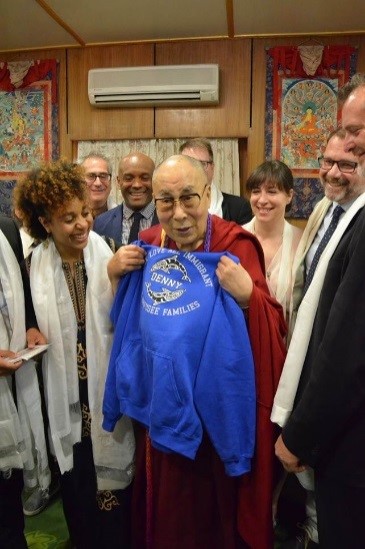 On a recent trip to Dharamshala, India, to meet with the Dalai Lama, the spiritual leader of the Tibetan people at his residence in exile, Ms. Lori Markowitz, presented his Holiness with a Denny sweatshirt as a gift from the entire Denny International Middle School community! He was pleased to see our logo includes the words, “We love all immigrant and refugee families” and was very supportive of our school motto, “We All Belong!” He sent a message of encouragement back to all the Dolphins to develop increased hope, compassion, and love in our community and in our world.
On a recent trip to Dharamshala, India, to meet with the Dalai Lama, the spiritual leader of the Tibetan people at his residence in exile, Ms. Lori Markowitz, presented his Holiness with a Denny sweatshirt as a gift from the entire Denny International Middle School community! He was pleased to see our logo includes the words, “We love all immigrant and refugee families” and was very supportive of our school motto, “We All Belong!” He sent a message of encouragement back to all the Dolphins to develop increased hope, compassion, and love in our community and in our world.
Here at Denny, we are very proud of our Youth Ambassadors program, which inspires our scholars to make a positive difference in our community. Ms. Markowitz has been an incredible supporter of our school by partnering with us to launch and continue Youth Ambassadors and by helping us to make powerful connections locally and around the world. We are inspired by the words of hope, compassion, and love from the Dalai Lama—and very grateful to Ms. Markowitz for helping us to make this powerful connection!
In the spirit of compassion,
Jeff Clark, Principal, Denny International Middle School
Ms. Lori Markowitz gave the following insight into her historic trip:
“What a wonderful way to celebrate the tenth anniversary of the Youth Ambassador program born during the seeds of Compassion conference April, 2008. Meeting his Holiness the Dalai Lama in India at his residence in exile was an honor and privilege I will certainly cherish for the rest of my life. To be able to travel with two of the very first Youth Ambassador students made the experience that much more memorable and powerful.
The messages his Holiness shared with us will remain close to our hearts. Habib and Olivia (remarkable Youth Ambassadors who I’ve had the privilege of working with for many years) will indeed continue to be ambassadors of hope, kindness and love.
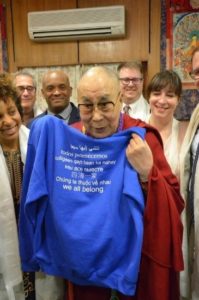 The Dalai Lama believes compassion and love need to be emphasized daily and included in the school curriculum. The idea is, if children are intentionally taught to be generous and joyful and to nurture empathy and mutual understanding (not in a religious manner) they will have a happier, healthier life. We saw many Tibetan wind horse flags representing goodwill, inner strength and positivity, ” Others Before Self” — the kind and giving spirit was palpable. The Youth Ambassador program is dedicated to cultivating compassion, providing unique learning experiences, building strong school communities, and investing students in a broader movement for positive change.
The Dalai Lama believes compassion and love need to be emphasized daily and included in the school curriculum. The idea is, if children are intentionally taught to be generous and joyful and to nurture empathy and mutual understanding (not in a religious manner) they will have a happier, healthier life. We saw many Tibetan wind horse flags representing goodwill, inner strength and positivity, ” Others Before Self” — the kind and giving spirit was palpable. The Youth Ambassador program is dedicated to cultivating compassion, providing unique learning experiences, building strong school communities, and investing students in a broader movement for positive change.
Giving his Holiness the Denny International Middle School “we all belong” sweatshirt as a gift was truly an honor! Currently, the Youth Ambassador program is embedding a civics and compassion curriculum allowing students to become more engaged citizens involved in making their own neighborhoods better areas to live and thrive in, a vital component of a thriving democratic society.”
Posted: June 22nd, 2018 under Councilmember Herbold, Education, Homelessness, Libraries, Parks and Recreation, Police Department, Public Health, Seattle Public Utliities, Transportation
Tags: Dalai Lama, Denny International Middle School, district 1 map, free summer meal for youth, hate crime motivation, plastic straw and utensils ban, Vehicle exhaust noise legislation, voting 2018

